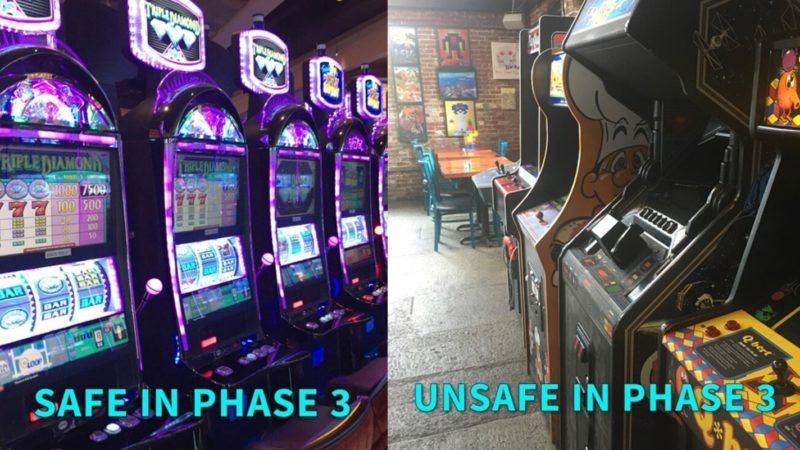Are Video Arcades More Dangerous Than Casinos During a Pandemic?
A federal lawsuit argues that the distinction drawn by Massachusetts is unconstitutional.

Casinos and video arcades, both of which feature rows of electronic games that people use in close proximity to each other, pose similar risks of COVID-19 transmission. Yet in Massachusetts, casinos have been open for two months, while video arcades remain closed under an order that Gov. Charlie Baker originally issued in March.
Like many of the distinctions drawn by the COVID-19 lockdowns that all but a few governors imposed last spring, this one makes no medical sense. A federal lawsuit filed last week argues that Baker's discrimination against video arcades is unconstitutional because it is scientifically indefensible.
Baker originally included video arcades in Phase III of his reopening plan, which took effect on July 6, but changed course without explanation on July 2. In response to a state legislator's inquiry, the governor offered nothing but boilerplate about "the latest science" and "input from public health experts."
You might wonder what sort of science tells us that video games played for fun are inherently more dangerous as disease vectors than video games played for the chance to win money. So does Gideon Coltof, the owner of Bit Bar, a restaurant-arcade in Salem.
Coltof notes that businesses like his can take the same precautions casinos are taking. They can erect barriers or maintain physical distance between customers, and they can wipe machines down between users.
Yet while Baker is allowing Coltof to operate his restaurant during Phase III, the governor has decreed that Coltof may not turn on his video games. For a business whose main attraction is the opportunity to play classic arcade games while eating, that restriction could be a death sentence.
If Baker's order stands, says Coltof's motion for a preliminary injunction, "Bit Bar likely will go out of business and will not be able to open again even after all COVID-19 orders are lifted." Ordinary arcades are even more vulnerable to that fate, all because of Baker's pseudoscientific whim.
The absurdity of Baker's policy is illustrated by its implications for the Ms. Pac Man machines that Coltof uses as dining tables, which the governor says he may continue to do as long as the machines are turned off. According to Baker's logic, Coltof's motion notes, "this table turns into a deadly disease vector" if you "flip the switch" and turn it on.
What recourse does a business owner have when confronted by such livelihood-killing capriciousness? Coltof's lawyer, Marc Randazza, argues that Baker's distinction between casinos and video arcades is a content-based restriction on speech, which makes it presumptively unconstitutional.
The Supreme Court has recognized that video games are a form of constitutionally protected speech. "There is no meaningful distinction between the permitted and forbidden games other than their content," Coltof's motion says.
Content-based speech restrictions are subject to "strict scrutiny," which means they must be "narrowly tailored" to further a compelling government interest. It is hard to see how Baker's arbitrary policy can satisfy that test.
In fact, Randazza argues, the governor's edict would fail even the highly deferential "rational basis" test, which requires only that a challenged rule be "rationally related" to a legitimate government purpose. "There are no facts that would support the assertion that a casino with electronic gambling machine kiosks is a safer environment than a restaurant-arcade that uses similar video game machine kiosks in a similar layout," the motion says.
For the same reason, Randazza claims, Baker's policy violates the 14th Amendment's guarantee of equal protection. That provision, which requires that similarly situated people be treated alike, has extra force when the government interferes with a fundamental right such as freedom of speech.
If you're not a fan of Ms. Pac Man, Galaga, or Q*bert, this case might not strike a chord with you. But Coltof's complaint poses the same question that Americans across the country have been asking for months: Are there any limits to what the government can get away with by invoking public health?
© Copyright 2020 by Creators Syndicate Inc.


Show Comments (42)